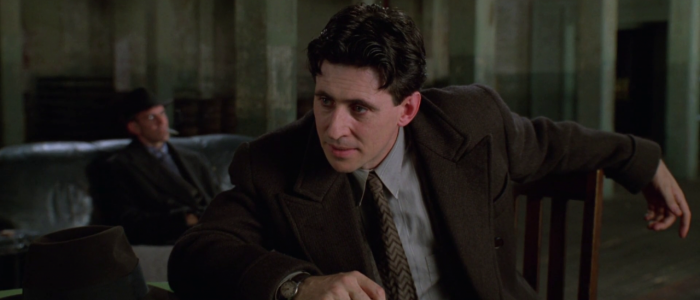The Future And The Past: How 'Hail, Caesar!' Fits In The Coen Canon
With Hail, Caesar!, Joel and Ethan Coen have crafted a movie that's amusing but baffling, challenging but easygoing, and frivolous but about everything. It's a film that wears its frustration on its sleeve like a badge of honor, inviting you to engage with it even as it tries to hard to keep you at a distance. It's funny and sad, silly and serious. In other words, it's a Coen brothers movie. We're all probably going to like it a lot more in five years if we're unsure about it now.
Now that Hail, Caesar! has been out for an entire weekend and you've had a chance to see it (because you definitely went out and saw the new Coen brothers film on its opening weekend, right?), let's take this opportunity to explore how this Hollywood farce fits into the larger Coen canon. Like all of their films, this film reflects their larger worldview and shares ideas with some of their best work. Hail, Caesar!, halfway between Barton Fink and A Serious Man, a cousin of Inside Llewyn Davis and Miller's Crossing, feels like it fills a specific gap in their overall filmography.
Naturally, spoilers lurk ahead.
A Serious Lead
Josh Brolin's Eddie Mannix recalls several past Coen brothers protagonists, even though they may seem to be at odds with one another upon first glance. The head of production at Capitol Pictures (with a name torn straight from real life, but we'll get to that in a second) is two very different men, depending on the scene. In public, he's an unflappable leader, a man who knows how the game is played and controls every angle like a master. In private, he's a guilt-ridden mess, a man who visits his priest on a daily basis and searches for spiritual guidance to justify his strange life in this business that seems so frivolous, so temporary.
The public Eddie Mannix recalls Tom Reagan of Miller's Crossing, the right-hand-man gangster who navigates the criminal underworld like a pro. Until he doesn't. Both Hail, Caesar! and Miller's Crossing initially showcase their leads in their element, doing ugly work, but doing it well enough to earn our grudging respect. Because that's how the movies work: you can't help but like someone who is good at their job. However, both films also pull the rug out from underneath the lead without wasting any time and the rest of the story is spent watching them flounder and find their footing in a dangerous new situation that pushes their improvisational skills to the brink. Reagan is perhaps a bit more outwardly bumbling than Mannix, but they both represent a clear Coen type – the Smart Guy, the mastermind, who is reduced to being as desperate at those he lords himself over.
However, Mannix's private life is a very different shade of Coen business. Although Hail, Caesar! isn't quite the Catholic answer to A Serious Man, the echoes are there. Mannix's search for God recalls Larry Gopnik's quest (which ended in abject failure) to find spiritual guidance and answers that would actually allow him to make sense of his life and existence. Both films lean heavily on the religious guilt of their lead, but the outcome is decidedly different for both of them.
The Old Testament God of A Serious Man doesn't heed Larry's calls for assistance, but he certainly seems to be going out of his way to ruin his life. The Christian God that Mannix so desperately wants to please also doesn't step in to provide divine intervention (it's no accident that the divine presence in the film within a film still hasn't been shot), but he seems more passive, more forgiving. Larry's religious quest ends in ethical doom and possible death for those he cares about; Mannix's journey concludes with him realizing that God wants him where he is and that even considering that job offer was a foolish bit of business. The movies may not matter as much as airplanes, but this is where the Divine wants him to be. God doesn't hand-deliver answers, but he's a capitalist at heart – he doesn't have time to let himself get ruined while he sits around and waits.
Inside Alden Ehrenreich
When Oscar Isaac was cast in Inside Llewyn Davis a few years back, you could hear film fandom's collective "Who?" This was before A Most Violent Year and Ex Machina and Star Wars: The Force Awakens and Show Me a Hero. This was back when Isaac was just an interesting actor who had small roles Drive, Robin Hood, and The Bourne Legacy. The Coens casting Oscar Isaac right before he became Oscar Isaac was a canny move. In retrospect, the film now stars one of the best and most beloved actors working right now.
Is that how we're going to feel about Alden Ehrenreich in a few years? In a film where virtually every single part is played by a movie star or a recognizable character actor, Ehrenreich still manages to stand out. Hell, he doesn't just stand out – he steals the movie from everyone else around him. His Hobie Doyle is the best character in movie and the catalyst for its biggest laughs and even some of its most important dramatic punches. This is a role that could have easily gone to a movie star or someone with recognizable face. Instead, some guy who starred in Beautiful Creatures nabbed the part and he owns it. This is the kind of performance that puts an actor on the map. In a few years, it wouldn't be surprising at all to recognize him as part of a star-studded ensemble and not the lone exception.
Hobie Doyle works in the same way that Fargo's Marge Gunderson works. He's a blue collar guy stuck in a world that underestimates him. He's an honest man, a good person, operating within a system that isn't always pleasant or warm or instantly rewarding. And because he has a funny accent and because he's not sophisticated, he looks to be the butt of the joke, a vehicle for "Haha, look at the rube!" gags. But the Coens actually respect his convictions and ultimately reward his loyalty and showcase his sharp instincts. While so many of the other characters in Hail, Caesar! operate in the shadows, Hobie is as honest as they get. This kind of straightforward, homespun hero is hard to capture without looking too simplistic, but Ehrenreich imbues him with the right amount of soul and quiet wit.
O History, Where Art Thou?
It's possible to watch and enjoy Hail, Caesar! without knowing much about the golden age of Hollywood, but it becomes all the more amusing when you can start to connect the historical dots. I'm initially reminded of films like O Brother, Where Art Thou? and Barton Fink, which take place in specific times and in specific places to take very specific advantage of those settings, but Hail, Caesar! actually takes the Coens' interest in Americana to the next level.
While many characters in the sprawling ensemble have real-word counterparts, only Brolin's Eddie Mannix has a name directly taken from actual Hollywood history. A notorious "fixer" for MGM, the real Mannix was a nasty piece of work, a real sonuvabitch, who helped shape the narrative of his studio's talent by force. You may remember him in Hollywoodland (where he was played by Bob Hoskins), a film that didn't shy away from his more villainous qualities. That the Eddie Mannix of Hail, Caesar! is a good man at heart who feels tremendous shame for what he has to do in the name of moving pictures feels like a quietly brilliant gag for anyone who knows a thing or two about the real guy.
The same joke applies to "The Future," the cabal of Communist screenwriters who conspire to abduct George Clooney's movie star and ransom him to empower their Soviet cause. In a year where well-meaning but ultimately forgettable movies like Trumbo reminded us that the Hollywood blacklist remains one of the most shameful moments in the history of the film industry, the always-sneaky Coens have crafted an entire subplot that concerns left-leaning screenwriters actually doing what so many men and women were false accused of doing in reality: using the movies to spew Communist propaganda to weaken America at its core. It's an incredibly specific joke, so much so that it may not even initially read as a joke, but the Coen brothers' twisted inversion of Hollywood history is a joy. This isn't reality, but rather a reality that so many people actually thought existed (although it never did), filtered through farce.
Art, Simple
Like many of the Coen brothers' more fringe movies, Hail, Caesar! is a bit opaque. It asks its questions and it wallows in the non-answers, an intentional choice that is frustrating in the moment but rewarding in the long term. I like the movie more on Monday morning than I did on Thursday night. This is the kind of movie that feels like it will grow on you – the more you consider its questions and the more you appreciate its pleasures, the more you can appreciate the quiet high-wire act that the Coens pull off.
Ultimately, it feels like the Coen brothers have finally gone and made their "movie about movies," a chapter in the career of every filmmaker who works long enough to get around to it. They've dabbled in this territory before with Barton Fink, which painted Hollywood and the film industry as a literal Hell where creative people are imprisoned and subjugated to all kind of indignities. They've explored the creative process with Inside Llewyn Davis, a complex portrait of artistry and integrity that ultimately lands hard on the side of cynicism – if you're not willing to sell out just a little bit and if you're not in the right place at the right time, you're screwed.

But Hail, Caesar! is more blunt about the creative process and more appreciative of Hollywood, even when it gets ugly. There's sad, underhanded stuff going on in the film (Scarlett Johansson's DeeAnna Moran is an echo of too many real-world starlets), but the whole mood of the film is downright giddy. The Coen brothers love the sordid history of the movies and they want you to love it with them. After all, this community of grotesques and weirdos and Communists and cowboys and gangsters and artists didn't just wallow in depravity and work to undermine each other – they made great goddamn movies.
There's a reason Hail, Caesar! so frequently stops in its tracks for extended scenes from films within the film, most of them representing genres that are essentially dead. Watching Channing Tatum song-and-dance his way through a horny sailor musical is a sublime recreation of a cliche, a reminder that there's joy in a genre and a set-up that feels like a punchline today. The same goes for Johansson's aquatic musical number, Ehrenreich's goofy western, and even Clooney's overwrought Bible epic. The Coens exactingly recreate these dead styles and luxuriate in them because they love movies, damn it! They love movies and they want you to love them, too. Beyond the frame are stars in pain, angry directors, anguished studio heads and all manner of human drama, but these people were able to shuffle it to the side to create something beautiful and special.
Now that's movie magic.
***





